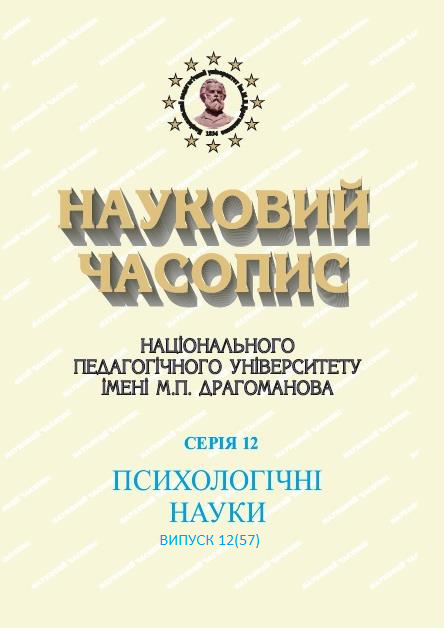HERMENEUTICS OF ACADEMIC INTEGRITY IN THE CONTEXT OF THE SPIRITUAL PARADIGM OF PSYCHOLOGY
DOI:
https://doi.org/10.31392/NPU-nc.series12.2020.12(57).05Keywords:
personality, academic integrity, spirituality, spiritual values, honesty, trust, justice, respect, responsibility, courageAbstract
In the context of educational reforms with a focus on European standards, there is a need to understand the fundamental values on which the educational process should be based and implemented. The article presents the results of the study of academic integrity as a conglomeration of spiritual values that demonstrate the personal position of the representative of the academic community in the educational space. The purpose of the studies to reveal the content of the phenomenon of academic integrity in the context of the spiritual paradigm of psychology. Objectives of the study are to determine the methodological provisions of the spiritual paradigm of psychology and reveal the content of the value spectra of academic integrity in the context of the spiritual paradigm of psychology. Such theoretical methods as analysis, synthesis, comparison. generalization and systematization of theoretical approaches and views to the problem of academic integrity, psychological hermeneutics were used. The starting point of the analysis of academic integrity in the context of the spiritual paradigm of psychology is the consideration of the personality of the academic community as a noological entity characterized by potential universality, creative and volitional orientation, immanent ability to choose good and deny evil, ontological attitude to self-knowledge. Spiritual values, which are the essence of academic integrity, are actualized in the minds of students, teachers (according to the specific situation of choice in the educational process). Each time these values are processed by “internal rethinking” through the prism of deontic choice and responsibility for its implementation realization of these values in a deed.
References
- Antonenko, I.V. (2004). Doveriye: sotsial'no-psikhologicheskiy fenomen. [Trust: a socio-psychological phenomenon]. Moscow : Sotsium [in Russian].
- Bakhtin, M.M. (1979). Estetika slovesnogo tvorchestva [Aesthetics of verbal creativity]. Moscow : Iskusstvo [in Russian].
- Vasyliuk, F.E. (1984). Psykholohyia perezhyvanyia (analyz preodolenyia krytycheskykh sytuatsyi) [Psychology of experience (analysis of overcoming of critical situations)]. Moscow : Izd-vo Mosk. Un-ta [in Russian].
- Vygotskiy, L.S. (2000). Psikhologiya [Psychology]. Moscow : Izd-vo EKSMO-Press [in Russian].
- Zynchenko, V.P. (2002). Razmyshlenyia o dushe y ee vospytanyy [Reflections on the soul and its upbringing]. Voprosy fylosofyy – Questions of philosophy, 2, 119–136 [in Russian].
- Yermolenko, A.M. (1999). Komunikatyvna praktychna filosofiia. [Communicative practical philosophy]. Kyiv : Libra [in Ukrainian].
- Kyrychuk, O.V., Kyrychuk, V.O., & Kyrychuk, V.V. (2008). Narodzhennia ta zrostannia dukhovnoi osobystosti: teoriia, diahnostyka, treninh. [Birth and growth of spiritual personality: theory, diagnosis, training]. Kyiv : VMHO “Soiuz obdarovanoi molodi” [in Ukrainian].
- Klymyshyn, O.I. (2013). Khrystyiansko-psykholohichni osnovy dukhovnoho rozvytku osobystosti [Christian-psychological foundations of spiritual development of personality]. Extended abstract of Candidate's thesis. Kyiv [in Ukrainian].
- Kon, Y.S. (1983). Slovar' po etike [Dictionary of ethics]. Moscow : Polytyzdat [in Russian].
- Kupreychenko, A.B. (2008). Psikhologiya doveriya i nedoveriya [The psychology of trust and distrust]. Moscow : Izd-vo “Institut psikhologii RAN” [in Russian].
- Malakhov, V.A. (2008). Pravo buty soboyu [The right to be yourself]. Kyiv : DUKH i LITERA [in Ukrainian].
- Moskaletsʹ, V.P. (1994). Psykholohichne obgruntuvannya ukrayinsʹkoyi natsionalʹnoyi shkoly [Psychological substantiation of the Ukrainian national school]. Lviv : Svit [in Ukrainian].
- Nalimov, V.V., & Drogalina, ZH.A. (1984). Veroyatnostnaya model' bessoznatel'nogo. Bessoznatel'noye, kak proyavleniye semanticheskoy vselennoy [The probabilistic model of the unconsciousness. The unconsciousness as a manifestation of the semantic universe]. Psikhologicheskiy zhurnal – Psychological journal, 5(6), 111–121 [in Russian].
- Savchyn, M. (2019). Zdorovia liudyny: dukhovnyi, osobystisnyi i tilesnyi vymiry. [Human health: spiritual, personal and physical dimensions]. Drohobych : PP POSVIT [in Ukrainian].
- Savchyn, M. (2011). Doslidzhennia osobystosti v konteksti dukhovnoi paradyhmy psykholohii [The study of personality in the context of the spiritual paradigm of psychology]. Psykholohiia osobystosti – Personality psychology, 1, 191–199 [in Ukrainian].
- Skripkina, T.P. (2000). Psikhologiya doveriya [The psychology of trust]. Moscow : Izdatel'skiy tsentr «Akademiya» [in Russian].
- Safonov, V.S. (1978). Osobennosti doveritel'nogo obshcheniya [Features of confidential communication]. Extended abstract of Candidate's thesis. Moscow [in Russian].
- Toftul, M.H. (2014). Suchasnyy slovnyk z etyky [Modern dictionary of ethics]. Zhytomyr : Vyd-vo ZHDU im. I. Franka [in Ukrainian].
- Finikov, T. (2016). Akademichna dobrochesnist: hlobalnyi kontekst ta natsionalna potreba [Academic integrity: global context and national need]. In V. Finikov & A.Ye. Artyukhov (Eds.), Akademichna chesnist yak osnova staloho rozvytku universytetu – Academic honesty as a basis for sustainable development of the university (p. 9–37). Kyiv : Takson. Retrieved from https://drive.google.com/file/d/0ByePGdGpHh6Wa1NoR3g4S1FaWVE/view [in Ukrainian].
- Fishman, T. (1999). Fundamentalni tsinnosti akademichnoi dobrochesnosti [The Fundamental Values of Academic Integrity]. Klemson : Universytet Klemson. Retrieved from http://www.academicintegrity.org/icai/ [in Ukrainian].
- Frank, S.L. (1992). Dukhovnyye osnovy obshchestva [Spiritual foundations of society]. Moscow : Respublika [in Russian].
- Frankl, V. (1997). Doktor i dusha [Doctor and soul]. Sankt-Peterburg : “Yuventa” [in Russian].

